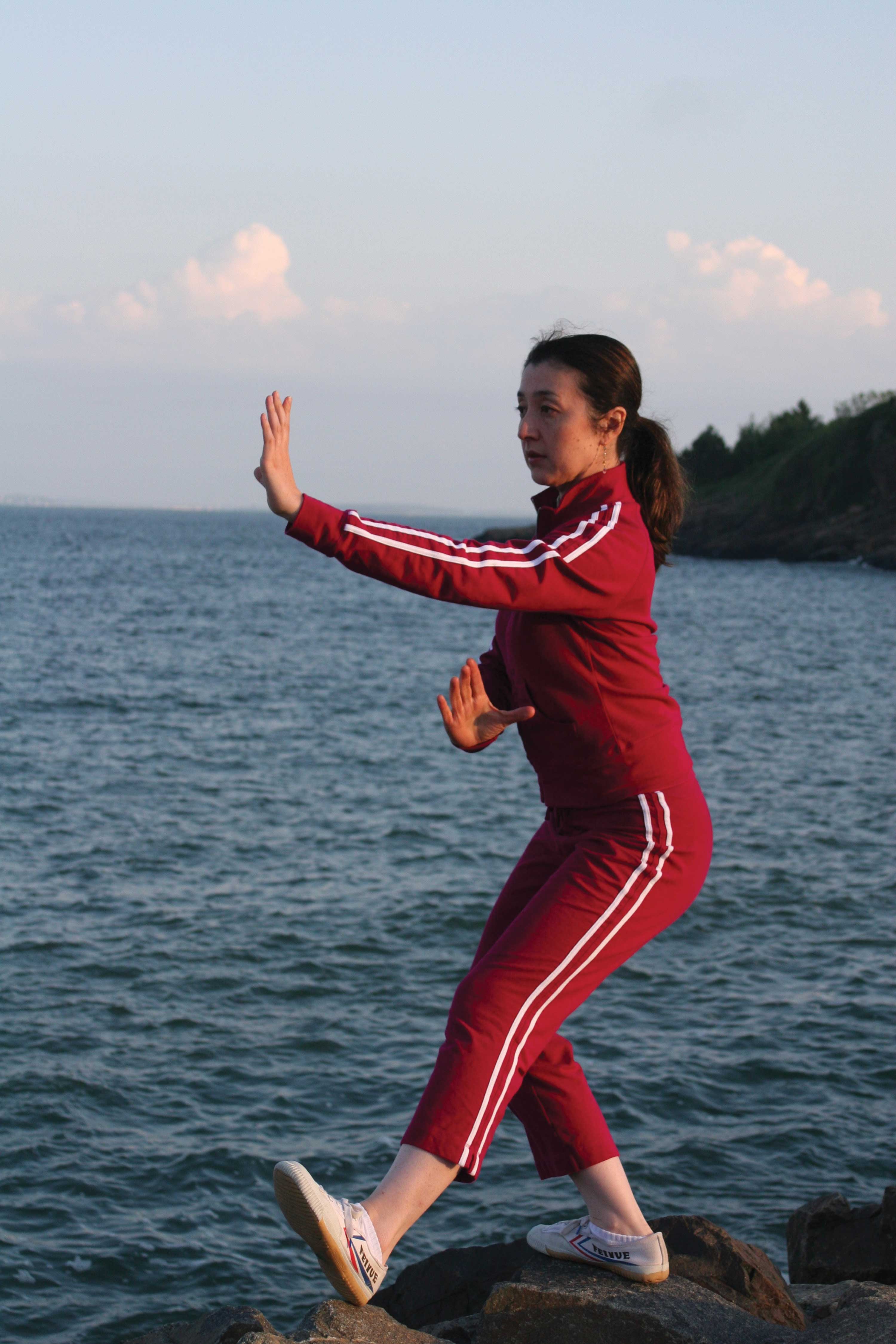
COURTESY OF LEDA ELLIOTT
Tai chi master Leda Elliott has extensive experience with both performative and competitive practices of wushu and is currently focused on teaching others the martial art.
As a woman well-aware of how important exercise is for your wellbeing, you dutifully keep track of your daily steps, you hustle to make time for the gym, and you opt to take the stairs whenever you can. However, you can’t help but feel like your current fitness routine is doing nothing for your mental health.
If this sounds familiar, you might want to take a page from Chinese martial arts; and no, we’re not necessarily talking about battling it out with an opponent. Although, have at it, if that’s your style.
We’re talking about wushu here, a contemporary martial art practice, of which tai chi is a form. According to Boston-based tai chi master Leda Elliott, “‘wu’ means war and ‘shu’ means art,” and it encompasses both combative and meditative styles.
Elliott started her modern wushu training in 1986 while attending Boston University. In 1996, she began her traditional wudang tai chi training under the guidance of the renowned Master Bow Sim Mark.
Today, Elliott teaches wushu to students of all ages, from young children to seniors, throughout the Boston area and at Bow Sim Mark Tai Chi Arts Association in Chinatown.
She believes that wushu can benefit everyone, especially women at the height of their lives.
“I think the internal arts like tai chi — which is a part of the wushu system — provides tools to the practitioner to cultivate energy, focus and discipline in the most harmonious and balanced way to the individual,” she says.
Elliott was trained in ballet since the age of three, through the encouragement of her mother. But while growing up in Japan, she read a manga novel about a Chinese girl who would use her kung fu skills to “put bullies in their place.” Martial arts became “what I really wanted to do instead of dance,” she says.
It wasn’t until she was on her own in college that Elliott was able to finally enter martial arts training in Boston with Bow Sim Mark who is “considered a national treasure in China.” His son, Donnie Yen, is the “biggest thing in Hong Kong right now,” says Elliott.
Her ballet background helped with the flexibility and coordination aspects of wushu, as it’s “not an easy thing and requires a lot of discipline and athleticism,” she says, especially with the external styles.
External styles of wushu is “what you see Donnie Yen, Jackie Chan or Jet Li do. It includes flashy acrobatic moves,” explains Elliott. “With internal styles, such as tai chi, rather than primarily working the external muscles, you have to go deep within yourself to understand the energy flow.”
This is something anyone can do up until old age, or after demanding styles of martial arts or sports becomes too hard on the body, creating injuries.
Although gentle, don’t think you won’t be getting some serious movement in with wushu practice. Rick Wong, a senior physical therapist at Spaulding Rehabilitation Hospital and skilled master in traditional kung fu and contemporary wushu, says, “When you look at elements of artistic wushu or combative wushu, they are all physical.”
He adds, “The thing that’s beautiful about tai chi and the internal martial arts is it gets you centered and relaxed within your inner self.”
“As people age, there is certain orthopedic, muscular and skeletal degeneration that occurs, but the internal vitality needs to be propagated,” says Wong.
Of her wushu practice, Elliott says, “It helps me stay connected to the authenticity and the flow of life. I’m like any other person, there are stresses in my life, but the discipline I have learned from tai chi helps me be able to not ‘lose it.’”
Women 35 and older have a lot on their plates, balancing career and family, often with little time for themselves. “Tai Chi helps them come back to themselves and connect with their Dao (their path) in the most harmonious and non-stressful way,” says Elliott. “It cultivates energy, rather than expend it, and it is very gentle on the body.”
Practicing wushu even once or twice a week can help women find inner calm, while still keeping the body moving.
Wong says, “Whether you’re a middle-aged or older person, or somebody in their 20s, it’s never too late to start your tai chi and internal wushu practice.”



 3 min read
3 min read